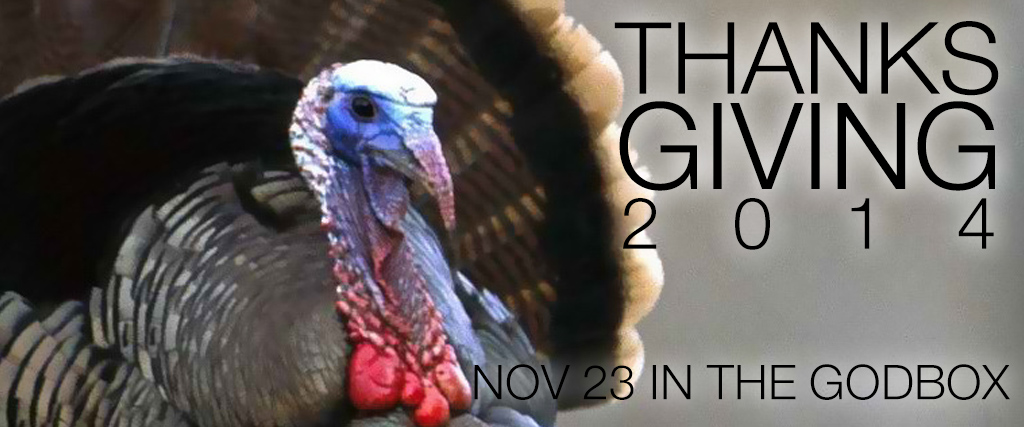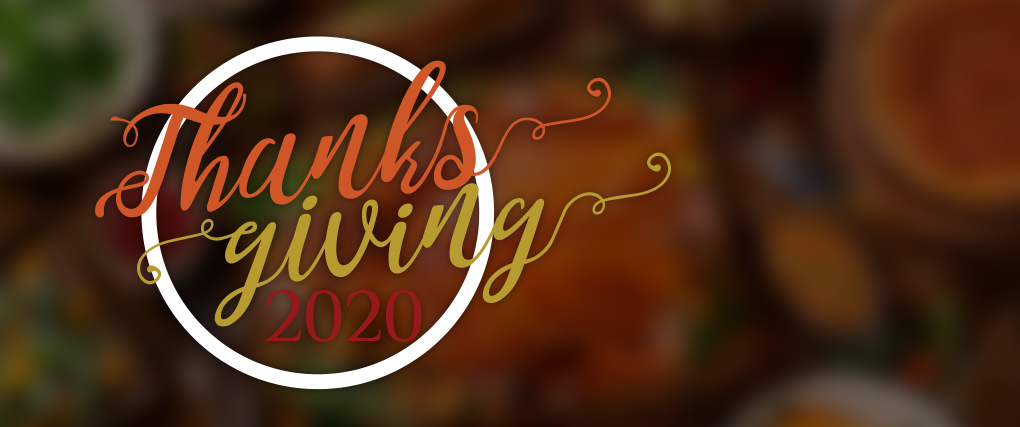Date: Nov. 23, 2014
Psalm 100:1-5
Happy Thanksgiving! As near the end of 2014, let us reflect on both the times of blessing and times of struggle in our lives to remind us that God is always good. He provides much for us in good times and he gives us the strength to overcome in trying times. He is Almighty God who is good, who is always with us, and for that, we give grateful praise to him.
Every year, on Thanksgiving, we all get asked this question: “So what are YOU thankful for?” And if you haven’t really thought about it, it may catch you off-guard and you’re forced to rattle off generic topics that come to your mind: my family, my life, my health, and so on. Those things may all be true and I’m in no way minimizing them, but I think there is a difference between just saying thanks and giving grateful praise.
As we think about the things that we are blessed with, let us not forget to give thanks to God. What does that mean? Well, in the 1984 NIV translation, this psalm is titled “A psalm. For giving thanks.” In the new NIV, the title is modified to “A psalm. For giving grateful praise.” I take this to mean that to when we give thanks to God, we are giving him grateful praise. Ok, so the translators switched out one word for two words. But what does grateful praise mean?
It’s an interesting change because it adds the element of praise to our thanksgiving. Unfortunately, it is an aspect that seems easy to forget or neglect as we grow older. What do I mean by that? Well, one just needs to listen to children give thanks: “Thanks Mom! (There’s the grateful) You’re the best! I love you so much! Thank you, thank you, thank you, thank you! (And there’s the praise)” followed by an expression of love like a hug or a kiss. Then by the time we’re teenagers, this gives way to the much shortened, “K, thanks,” if any thanks is expressed at all. When kids say thanks, they really really mean it; it’s not just a formality or phrase that’s thrown around. That’s grateful praise versus just simple vocal thanks. So how do we express grateful praise to God?
First, (Psalms 100:1) “Shout for joy to the Lord, all the earth.” This tells us that thanksgiving is active and joyful, not subdued and unspirited; our thanks turns into action and those actions are sincere and full of energy. It should excite you. Be vocal and let God know about the things that you are thankful for. Remember a time when you did something for someone else. Didn’t you appreciate it more when that person sincerely thanked you, maybe even throw a little grateful praise your way? You’re more likely to help that person again in the future. I’m not saying that we should thank God so that he’ll be more likely to answer our prayers in a favorable manner for you in the future, but rather that God is pleased when we give him our grateful praise. And when you do, do it with joy. The word itself, JOY, reminds us of the order in which we should prioritize our relationships if we want to be joyful: It stands for Jesus (J), Others (O), and then yourself (Y), in that order. If it’s not in that order, then it isn’t joy anymore.
Second, it will be an act of worship with gladness, neither passively nor forcibly done: (Psalms 100:2) “Worship the Lord with gladness; come before him with joyful songs.” God is holy, so praising God is a highly spiritual act. This act of worship is done out of our own willingness and gladness; no one can force you to be thankful. In many cases, this must be an active decision. It is easy to worship the Lord with gladness when he gives you many blessings and everything is going well in life. But life is not always easy. However, it doesn’t say “Worship the Lord with gladness when you feel good.” You must always worship with gladness. That’s why our worship cannot be based on life’s circumstances but on God himself.
Being grateful is a mindset; you can choose to complain or choose to give thanks. Here are some examples: You can complain about bad your job is, or you can thank God that you are able to provide for your family. You can complain about your meal, or you can thank God that you have enough to eat. Commuters, you can complain about horrible traffic (especially in Chicago), or you can be thankful that you even have a car to drive. Students, you can complain about having too much homework, or you can thank God that you have the privilege of receiving an education. Kids, you can complain about doing house chores, or you can thank God that you’re not homeless. Parents, you can complain about your children when they don’t do what you want, or you can thank God that he gave you a precious life to love and take care of.
Here’s a story to illustrate this concept: one man was traveling along the highway when he got robbed. Instead of complaining and feeling sorry for himself, he found 4 things to be thankful for: 1) he thanked God he had never been robbed before, 2) he thanked God that although he lost his money, he did not lose his life, 3) although he was robbed, he actually didn’t have much to begin with, 4) he thanked God that he was the one who was robbed and not the one robbing others. He worshipped God with gladness regardless of what his present circumstances were; he had an attitude of gratitude.
Why could this man be so thankful after a terrible thing? Because he knew who God is. (Psalms 100:3) “Know that the Lord is God. It is He who made us, and we are his; we are his people, the sheep of his pasture.” He is our Creator, he is our Father, and he is our Shepherd. This is actually the foundation of our thanks. If you don’t know who God is, how you can properly praise him or thank him? The Lord is the Almighty God, the Ruler of the Heavens and the Earth. He is in control of everything; he gave us life. We did not make ourselves, but God created us in his own image, none less, and we are his people. God doesn’t want to be some nameless, distant, authority figure. He is a personal God who calls us by name, who wants to be with us, and who created us in his own image. He watches over us, protects us, provides for us, listens to our prayers, and answers them (sometimes, the answer is no). It is such an amazing thing, unfathomable really, that we can have a relationship with the One True God, that we belong to him and that he knows us each personally. Obama may be my President, but he doesn’t know me and he’s only the President of the United States. Our Lord God reigns over all creation and he knows me better than I know myself, down to the number of hairs on my head (which is a lot less than before).
God also invites us into his Kingdom. Verses 4 and 5 say, “Enter his gates with thanksgiving and his courts with praise; give thanks to him and praise his name. For the Lord is good and his love endures forever; his faithfulness continues through all generations.”
God invites us to (Psalms 100:4) “Enter his gates with thanksgiving.” We don’t “sneak” into his gates, we don’t have to find a way around these gates, and we don’t have to feel excluded from his Kingdom. It doesn’t say, “people who have read the entire Bible, enter,” or “people who have gone to church every Sunday, enter,” but everyone is invited to enter. In addition, when we enter, we enter with thanksgiving, not with the guilt of our past sins, not with heavy burdens we carry in our hearts, and not with sorrow or grief. He invites us all to join him in the Kingdom of God, in all its glory, with joy and thanksgiving. Now, it’s easy to be thankful when we are happy and things are going well. But what about when things aren’t going well or we lose something or someone we loved. But we all go through tough times; that’s life. But how can you shout for joy during those times? How can we enter his gates with thanksgiving?
Let me share something with you. A couple weeks ago, I was interviewed by two seventh graders. They asked me to describe an obstacle/struggle in my life and how I overcame it. A simple question but one that I hadn’t given much thought to recently. Now you’re probably wondering, “What does that have to with Thanksgiving?” Because I believe reflecting on our struggles helps to think about what we are most deeply thankful for. This is a sample of my thought process while I struggled with an answer to their question: the first thing that popped into my mind was medical school and sacrifices I’ve made in order to do well. Next, I thought about how a previous significant other cheated on me after five years, which put me in a really depressed mood for over a year. Then, I thought about my parents’ divorce and how that broke my family apart, leaving me with internal struggles for years.
It really sucked to go through these experiences. Nothing obvious to shout for joy about. When those things in life are broken, how can one give thanks, much less give grateful praise to God? In times in despair and difficulty, it’s hard to understand why we have to endure such hardship. It’s not easy to experience loss and suffering, but verse 5 is essential to hold onto in those times. “For the Lord is good and his love endures forever; his faithfulness continues through all generations.” When times seem difficult or hopeless, remember that there is a light at the end of the tunnel and that God is good. Through my professional training, God has given me a purpose and direction to help heal people of their suffering. Through my broken relationship, he freed me from something that hindered my growth and taught me how to depend on him. Through my broken family, he enabled me to understand and help others get through similar situations. He also gave me my sister, whose birthday just so happens on Thanksgiving this year. Through each trial of my life came blessing as well, blessings that I did not see immediately, but I believed that God is good and can testify that he most certainly is. God is my shield, my very great reward; He turns my sufferings into joy.
The Lord is good. Yet, even this simple fact is so hard for many people to accept. If God is so good, why do terrible things happen to good people every day? Why is there so much suffering, persecution, violence, evil in the world? One thing that this reminds me of is our International Day of Prayer that we observed a couple weeks ago. Our brothers and sisters are being persecuted, killed, tortured; their churches are torn down, their meetings disbanded. Sometimes, their own family rejects them and their faith gets tested every day, but their testimony is that God is good; they are joyful regardless of their circumstances and all they request from us is our prayer support. It is hard to remember that God is good when we are struggling with difficult obstacles in our lives but this is an essential truth to hold on to if we want to be able to give thanks in all circumstances.
His love endures forever and his faithfulness continues through all generations. How many things in this world last forever? Nothing, the Bible tells us that everything will perish, spoil, or fade. But God’s love endures forever because God himself is eternal. Imperishable things cannot come from the perishable, but only from the imperishable and God is imperishable. Out of his love, God gave us his one and only Son to die on the cross to cover our sins so that we may join him for eternity in the Kingdom of God. From the very beginning, God loved man, gave him a paradise to live in and a partner to help him. When man fell, God immediately came up with a plan to save him, keeping true his promise throughout the generations for a Savior to come to us here on Earth. And when Christ died and rose again, he gave us the gift of the Holy Spirit to be with us in our hearts. Even in the future, God promises that his return and Satan’s hold will be broken over this earth. Throughout all time, there was God, there is God, and there will be God.
God has given me so many people and things that I am gratefully thankful for. I do not have the time to list them all. I gratefully thank God for people like the Timlins, who serve God beautifully and who welcomed me into their family when my own was broken. I gratefully thank God for my Bible teachers, Len and Mike who served as godly models for me as I had the privilege to study the word of God with them since they were undergraduates. I gratefully thank God for Shepherd Bob and the IIT ministry, who are a source of great encouragement and love for me and whom I have the great privilege of serving God with. I gratefully thank God for the Missionaries Henry and Pauline and the Ohio State ministry, who welcomed me with open arms and helped me to grow as a young man in God facing new struggles in a new environment. I gratefully thank God for Benji, who first invited me to come to church, even if it was to play Pokémon originally, and who was the first person to ask me, “Do you believe in God?” I gratefully thank God for Jesus, who took my sins upon the cross and covers over my faults to restore my relationship with God.
We give grateful praise to God because he is the eternal Almighty Creator and God is good. God created us and we are his. God loves us and is faithful to his promises. He mends the broken relationships that sin causes in our lives, whether it is with other people or with God. I invite you to meditate on the struggles and the relationships that you have. Make an active decision to praise God and see what you have rather than on what you don’t. Shout for joy all the things you are gratefully thankful for. Remember who God is.
I want to share just one more verse with you: (2 Corinthians 4:15), “All this is for your benefit, so that the grace that is reaching more and more people may cause thanksgiving to overflow to the glory of God.” I gratefully thank God for all of you in my life because I would not be here without the grace of God, who touched your lives, and in turn, you touched mine. May God use my life to touch the lives of those around me as well. Let this cause thanksgiving that overflows to the glory of God. As we close, let us (Psalms 100:2b) “come before him with joyful songs.”







